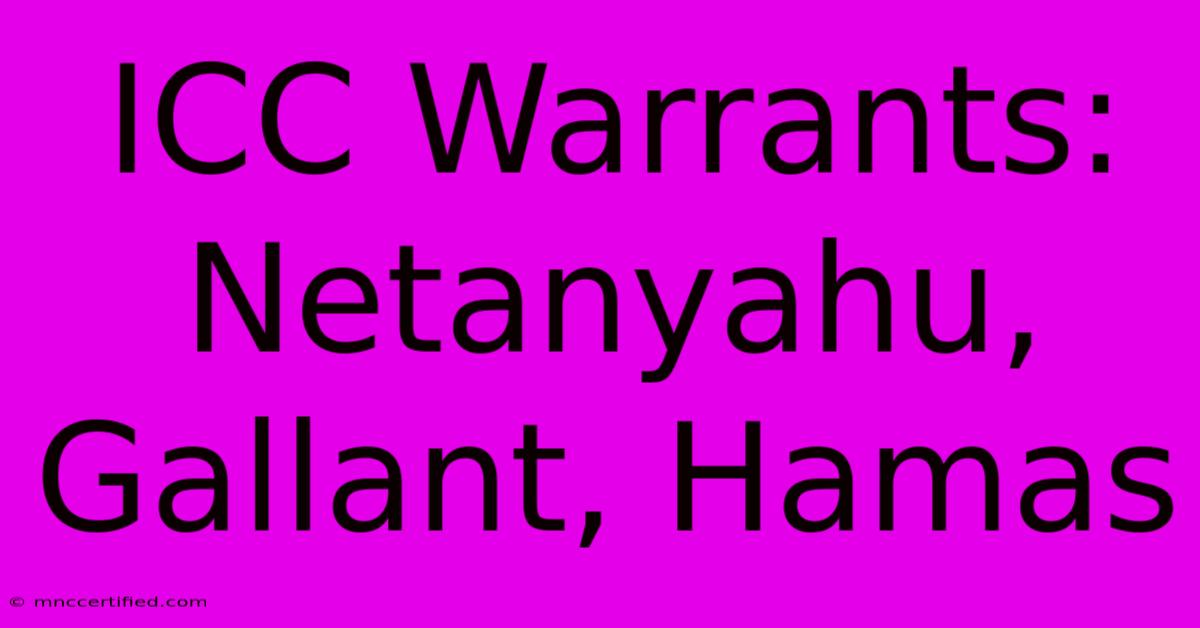ICC Warrants: Netanyahu, Gallant, Hamas

Table of Contents
ICC Warrants: Netanyahu, Gallant, Hamas – A Deep Dive into the Controversy
The International Criminal Court's (ICC) investigations into alleged war crimes in the context of the Israeli-Palestinian conflict have ignited a firestorm of international debate. Recent developments, including potential warrants for Israeli officials like Prime Minister Benjamin Netanyahu and Defense Minister Yoav Gallant, alongside the ongoing investigation into Hamas, have brought the complexities of international law and geopolitical realities into sharp focus. This article will delve into the intricacies of the situation, examining the ICC's jurisdiction, the accusations leveled, and the potential ramifications.
The ICC's Jurisdiction and the Israeli-Palestinian Conflict
The ICC's jurisdiction is a contentious point. Israel, like the United States, is not a signatory to the Rome Statute, the treaty establishing the ICC. However, the ICC argues it has jurisdiction based on the principle of territoriality, asserting that alleged crimes were committed within the Palestinian Territories, which the Court considers to be within its purview. This claim rests on Palestine's declaration of acceptance of the Rome Statute in 2015, a move vehemently opposed by Israel.
The Arguments for and Against ICC Jurisdiction
Arguments in favor of the ICC's jurisdiction often highlight the need for accountability for alleged war crimes and crimes against humanity, regardless of the perpetrator's nationality or the state's status as a signatory to the Rome Statute. Proponents emphasize the importance of international law and the prevention of impunity.
Arguments against the ICC's jurisdiction frequently focus on its perceived bias against Israel, questioning the legitimacy of its investigations and the potential for politicization. Critics also raise concerns about the ICC's impact on Israel's security and its potential to impede peace negotiations. The argument often centers on the assertion that the ICC is overstepping its boundaries and interfering in a complex geopolitical situation.
Accusations Against Netanyahu, Gallant, and Hamas
The ICC's investigation encompasses a wide range of alleged offenses, including:
Allegations Against Israeli Officials (Netanyahu & Gallant)
Potential warrants for Netanyahu and Gallant, if issued, would likely stem from investigations into alleged war crimes committed during military operations in the Gaza Strip and the West Bank. Specific accusations may include:
- Proportionality of force: Allegations that Israeli military actions have resulted in excessive civilian casualties, violating the principle of proportionality in warfare.
- Targeting of civilians: Accusations that Israeli forces intentionally or recklessly targeted civilians.
- War crimes: Claims of violations of the laws of war, including the use of excessive force and the destruction of civilian infrastructure.
It's crucial to note that these are allegations, and the ICC's investigations are ongoing. No official charges have been filed against Netanyahu or Gallant at this time.
Allegations Against Hamas
The ICC's investigation also targets Hamas, the de facto governing authority in Gaza. Accusations against Hamas center around alleged war crimes and crimes against humanity, including:
- Targeting of civilians: Allegations that Hamas intentionally targeted Israeli civilians with rocket attacks.
- Use of human shields: Accusations that Hamas utilizes civilians as human shields during military operations.
- War crimes: Claims of violations of the laws of war, including the indiscriminate targeting of civilians.
The International Ramifications and Potential Outcomes
The situation surrounding the ICC warrants carries significant international ramifications. The potential issuance of warrants against senior Israeli officials could further escalate tensions in the region and damage Israel's relationships with various countries. Conversely, a failure to hold those accountable for alleged war crimes could undermine international law and the pursuit of justice.
The ICC's investigation remains highly sensitive and politically charged. The potential outcomes, including the issuance or non-issuance of warrants, will likely have profound implications for the Israeli-Palestinian conflict and the broader landscape of international law and justice.
Conclusion: Navigating a Complex and Contentious Issue
The ICC's investigation into alleged war crimes in the Israeli-Palestinian conflict is a complex and highly sensitive matter with far-reaching implications. Understanding the legal arguments, the accusations leveled against both Israeli officials and Hamas, and the potential international ramifications is crucial for navigating this contentious issue. The ongoing investigations highlight the enduring challenge of achieving accountability for alleged atrocities while addressing the delicate geopolitical realities of the conflict. The future developments in this case will undoubtedly shape the discourse surrounding international justice and the Israeli-Palestinian conflict for years to come.

Thank you for visiting our website wich cover about ICC Warrants: Netanyahu, Gallant, Hamas. We hope the information provided has been useful to you. Feel free to contact us if you have any questions or need further assistance. See you next time and dont miss to bookmark.
Featured Posts
-
How Much Does Bar Insurance Cost
Nov 22, 2024
-
Hamas Israeli Leaders Targeted By Icc
Nov 22, 2024
-
Are Lincolns Expensive To Insure
Nov 22, 2024
-
Morgan On Ellens Show Cancellation
Nov 22, 2024
-
Mens Swimming Princeton Vs Penn And Cornell
Nov 22, 2024